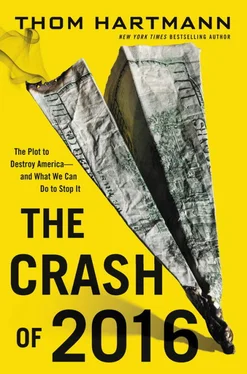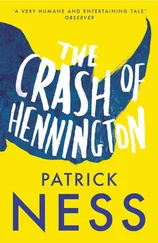The ironic thing about Palin’s message was that so-called death panels are actually a very real thing in America. Every single day, death panels at for-profit health insurance corporations determine whether or not it’s worth paying out a certain claim or signing on to a certain lifesaving medical procedure. In those cases, a “subjective judgment” is made on how a cancer patient’s chemotherapy will affect the corporation’s bottom line.
It was exactly this sort of abuse that President Obama’s Affordable Care Act was trying to curb. But in the perversion of the health reform debate, somehow that message got reversed. And even though there was no such thing as a “death panels” provision in the health reform bill, it was an issue that dominated much of the health care debate in the summer of 2009.
Another myth was that the president’s health reform would amount to a government takeover of the private health insurance industry. Given the antigovernment fervor sweeping the nation after thirty years of bad government under Royalist Republicans, this myth gained a lot of traction.
The Royalists warned that President Obama was taking over the American health care system with all its advanced MRI machines and laser surgeries and cutting-edge medication, and transforming it into a socialized, rationed health care system like the ones that were killing off millions of people in “Communist Europe.” It was a myth that everyone who lives outside the United States, in particular in Canada and Europe, regarded as patently absurd. Europeans have far better health care results than Americans, and nearly every single person I’ve talked to from a nation that has a single-payer system told me they prefer their health care system to mine any day of the week, thank you very much.
But Royalists were able to find a handful of Canadians who’d had a bad experience with their home health care system and paraded them around as victims of “socialized medicine.” Eventually, like the “death panels” myth, the government takeover myth stuck, too.
It grew out of the Public Option component of the health reform law.
In some parts of the country there was only one health insurance choice for consumers. One big for-profit health insurance corporation held a monopoly over the local market and could therefore charge whatever they liked and treat their customers however they liked. To inject some competition (the stuff Royalists claim to love) into the market, a government health insurance program was conceived that would serve as a more efficient and compassionate alternative to private health insurance plans. In the proposed health reform legislation, this alternative was known as the Public Option. The idea is simple, give people a choice and let the free market decide.
The Public Option was a far cry from what progressives wanted, which was a single-payer system. But if private health insurance corporations suddenly had to compete, then maybe prices would get lower and quality would get better.
Royalists hated the idea, as you would expect, since their corporate donors knew that more competition in the markets meant less money diverted to the bonuses of health insurance executives such as “Dollar” Bill McGuire, who made a billion dollars working at United Healthcare.
So Fox News took up the cause. The subject of the Bill Sammon October 27, 2009, e-mail was: “Friendly reminder: let’s not slip back into calling it the ‘public option.’” 120
This e-mail was later obtained by the media-watchdog group Media Matters. It read in full:
1) Please use the term “government-run health insurance” or, when brevity is a concern, “government option,” whenever possible.
2) When it is necessary to use the term “public option” (which is, after all, firmly ensconced in the nation’s lexicon), use the qualifier “so-called,” as in “the so-called public option.”
The e-mail continued with two more “reminders” from Sammon about how to talk about the Public Option:
3) Here’s another way to phrase it: “The public option, which is the government-run plan.”
4) When newsmakers and sources use the term “public option” in our stories, there’s not a lot we can do about it, since quotes are of course sacrosanct. 121
Fox anchors did as they were told, and suddenly the phrase “Public Option” vanished from the Fox News airwaves.
Why the name change? Why call it a “government option” rather than its legal name, the “Public Option”?
The answer: polling.
About two months earlier, on the same airwaves, Republican pollster Frank Luntz went on The Sean Hannity Show and let slip a critical Republican messaging strategy. In regard to the Public Option, Luntz told Hannity, “If you call it a ‘public option,’ the American people are split… [but] if you call it the ‘government option,’ the public is overwhelmingly against it.” 122After all, a “government option” implied a government takeover of health care, which meant socialized medicine.
Hannity himself was blown away and immediately noted that Luntz made “a great point” and that from then on Hannity himself would use the term “government option.”
A new message was born.
Here was the Washington managing editor of Fox News, Bill Sammon, instructing his news anchors to use poll-tested terms that would help Republicans sway the public’s opinion against President Obama’s health reform law. It was plain-and-simple propaganda.
A few months later, Fox News’s manufactured fear of a “government takeover of health care” successfully forced Democrats to drop the Public Option from the health reform law.
Emboldened, Bill Sammon set his eyes on climate change.
A few months later, in December, the news was about Copenhagen, where world leaders were meeting to chart out a global solution to fight worldwide climate change. And Bill Sammon had another e-mail he needed to get out to his anchors about wording in the climate change debate.
The December 8, 2009, e-mail 123was titled “Given the controversy over the veracity of climate change data…”
Sammon instructed his anchors:
[W]e should refrain from asserting that the planet has warmed (or cooled) in any given period without IMMEDIATELY pointing out that such theories are based upon data that critics have called into question. It is not our place as journalists to assert such notions as facts, especially as this debate intensifies [emphasis Sammon’s].
Like the for-profit health insurance executives, the oil barons believed pending cap-and-trade legislation in the Senate could crimp their profits. And they knew that as long as climate change was in doubt in the public’s mind, there would be no urgency to pass climate change legislation. Once again, Fox News came to a monopolistic industry’s aid.
Fox News became ground zero for faux climate change science, and the soapbox on which every corporate-funded pseudoscientist could stand, raise doubts about climate change, and collect their paycheck or get their grants from the big oil industry, wealthy industrialists, or foundations with allied ideology.
And it worked, the first comprehensive climate change bill for our nation to consider in decades died in the Senate—the American Clean Energy and Security Act which contained the “cap and trade” provision—a proven method to reduce pollution that had been supported by both Republicans and Democrats dating all the way back to Ronald Reagan’s attempts to reduce acid rain in the 1980s.
On Fox News, “cap and trade” was routinely referred to by talking heads as “cap and tax”—another poll-tested term—and characterized as a Socialist plan to seminationalize the American energy market.
Thanks to Fox News, politicians heavily funded by the oil industry kept the status quo in place.
Читать дальше












